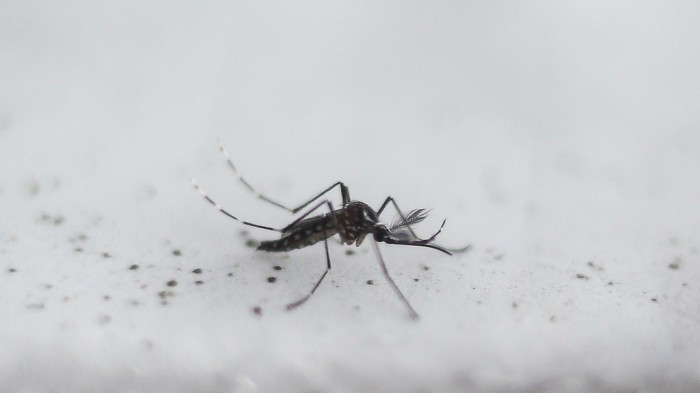Florida Vote Spells Uncertain Fate for Genetically Engineered Mosquitoes
A U.S. trial to test genetically modified mosquitoes designed to prevent the transmission of diseases like Zika and dengue could be stalled after residents in one Florida county cast conflicting votes on a referendum to allow the release of the insects.
In the island city of Key Haven, where the trial would take place, 65 percent of voters shot down a ballot measure on Tuesday that would have sanctioned the trial, while nearly 58 percent of residents of Monroe County, of which Key Haven is a part, supported the trial.
After receiving approval from the U.S. Food and Drug Administration in August, British company Oxitec planned to test its genetically modified mosquitoes in Monroe to see whether they would be effective in knocking down populations of the Aedes aegypti mosquito, which spreads viruses like Zika, dengue fever, and chikungunya. But opposition to the technology among local residents led the Florida Keys Mosquito Control District Board of Commissioners to hold back on moving forward with the trial until voters could weigh in during the general election.

The referendum is not legally binding, so the agency could still choose to go ahead with the trial when it next meets on November 19. Oxitec CEO Hadyn Parry is optimistic that will happen.
“To make this technology available to people to protect them from Zika in the short term, we want to go ahead and do the trial in Key Haven as planned,” Parry said Wednesday morning.
Parry said the trial is site-specific, so Oxitec would have to go back to the FDA to move the trial out of Key Haven. That means it could be delayed for several more months. In its August assessment, the FDA concluded that releasing the genetically modified mosquitoes will not have a significant impact on the environment.
Oxitec’s mosquitoes, which are all male, are engineered to have a so-called self-limiting gene. When these mosquitoes are released into the wild and mate with females, they pass on the gene to their offspring. The resulting offspring die before reaching adulthood, causing the the local mosquito population to crash.
The company has conducted five field trials so far, including in the Cayman Islands, Brazil, and Panama, and has seen a more than 90 percent reduction in mosquitoes wherever the engineered insects have been released. The Florida Keys Mosquito Control District spends about $1.1 million every year just on Aedes aegypti control efforts—which includes spraying of insecticides—for 25,000 residents. Those measures are able to reduce the local mosquito population by 30 to 50 percent. Derric Nimmo, who has led Oxitec’s efforts in Florida, said Oxitec’s method would cost about the same.
As of November 2, Florida has been home to all 139 locally acquired cases of Zika reported in the U.S.
Oxitec’s technology is one of several being explored to control outbreaks of mosquito-borne diseases in the U.S. and elsewhere. Nonprofits like Eliminate Dengue, as well as companies like Google, are also developing novel mosquito control techniques.
Keep Reading
Most Popular
Large language models can do jaw-dropping things. But nobody knows exactly why.
And that's a problem. Figuring it out is one of the biggest scientific puzzles of our time and a crucial step towards controlling more powerful future models.
How scientists traced a mysterious covid case back to six toilets
When wastewater surveillance turns into a hunt for a single infected individual, the ethics get tricky.
The problem with plug-in hybrids? Their drivers.
Plug-in hybrids are often sold as a transition to EVs, but new data from Europe shows we’re still underestimating the emissions they produce.
Stay connected
Get the latest updates from
MIT Technology Review
Discover special offers, top stories, upcoming events, and more.